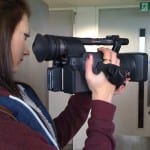 Hello! I’m Rachel Hagreen, a third year Media Production student. This is my first official post as a LSM student blogger, so I thought I’d take the opportunity to hand out a few pieces of advice for first year students studying Media Production or Film and TV, although the advice will almost certainly be useful for any student!
Hello! I’m Rachel Hagreen, a third year Media Production student. This is my first official post as a LSM student blogger, so I thought I’d take the opportunity to hand out a few pieces of advice for first year students studying Media Production or Film and TV, although the advice will almost certainly be useful for any student!
Two years ago if somebody had offered me advice I wouldn’t have bothered reading it because if we’re being totally honest all we care about this week is being a fresher and we tend to put our courses to the back of our mind at least for the first week but here’s my first piece of advice: read this list of advice from fellow third year students and try and take it all in!
Matthew Gambell, 3rd Year Media Production, Specialising in Single Camera:
 Work on your own projects outside of the course and make it public to get feedback.
Work on your own projects outside of the course and make it public to get feedback.
For example; make YouTube sketches, short films, produce radio podcasts. Refine your skills and you’ll benefit greatly from the practice in the second and third year.7
Glen Dolan, 3rd Year Media Production, Specialising in Television Production:
 Pay attention in first year semiotics; that stuff comes back with a vengeance! Timetable all deadlines… that way nothing gets left till the last minute. Keep a hard and digital copy of all lecture notes and reading materials. Get to know the library ASAP, if not you’ll waste too long trying to figure it out when essay time comes. Start essays early so you have time to leave it and re-read it with a clear head.
Pay attention in first year semiotics; that stuff comes back with a vengeance! Timetable all deadlines… that way nothing gets left till the last minute. Keep a hard and digital copy of all lecture notes and reading materials. Get to know the library ASAP, if not you’ll waste too long trying to figure it out when essay time comes. Start essays early so you have time to leave it and re-read it with a clear head.
George Bass, 3rd Year Media Production, Specialising in Single Camera:
In your first year get out of your comfort zone. Don’t produce anything that you think will get you a good grade, produce something that pushes your creativity.Take risks in your first year and make mistakes so you learn how to overcome them.
Never be afraid to ask questions; question everything, even question the lecturers in seminars because that’s what seminars are for (TOO MANY SILENT SEMINARS IN MY FIRST YEAR!). Prepare to fall out with people over you ideas when working in groups. However, learn to listen to other peoples ideas as there is never a time when you stop learning.”
Steve Staff, 3rd Year Media Production, specialising in Single Camera:
 My advice would be that if you haven’t created something by the end of your three years that isn’t a uni project, then you have probably wasted a lot of money. You learn more from the mistakes you make and the experiences you have working on outside projects than you ever will making notes in lectures.
My advice would be that if you haven’t created something by the end of your three years that isn’t a uni project, then you have probably wasted a lot of money. You learn more from the mistakes you make and the experiences you have working on outside projects than you ever will making notes in lectures.
Also, my second piece of advice would be appreciate the amount of equipment that you get to use for free; at no other time in your life will it be this easy to go grab a HD camera, some lights, sound equipment, lenses, tripods and a steadicam and go shoot a film and then edit it in an industry standard editing suite. Use it! Use it al!! If there’s a piece of kit in media loans you haven’t used by the time you leave, go grab it and play with it, the next time you get the chance to, someone will probably be charging you a small fortune. In short, don’t sit on your a*** for three years thinking that a degree certificate will make you Martin Scorsese. University isn’t hard, it’s making the most of it that’s tricky.
Chloe Ward, Media Production, Specialising in Television Production:
 Advice for first years would be, initially, don’t put all of your eggs in one basket. Approach all of the subjects in the first year with a totally open mind even if you think you will have a preference you might end up surprising yourself and loving something you though you never would or alternatively disliking something you previously really enjoyed. Don’t be afraid of expressing your own opinions when working in groups, even if you have a totally different view on something to the rest of the group, this doesn’t make it wrong. University is a place for sharing ideas and opinions so don’t be afraid to put your thoughts forward no matter how different they might seem.
Advice for first years would be, initially, don’t put all of your eggs in one basket. Approach all of the subjects in the first year with a totally open mind even if you think you will have a preference you might end up surprising yourself and loving something you though you never would or alternatively disliking something you previously really enjoyed. Don’t be afraid of expressing your own opinions when working in groups, even if you have a totally different view on something to the rest of the group, this doesn’t make it wrong. University is a place for sharing ideas and opinions so don’t be afraid to put your thoughts forward no matter how different they might seem.
Get involved in as much as you can outside of your course, not necessarily just course related activities such as volunteering at radio stations. Join different societies or sports teams, vary your University experience as much as you can, this will make you a more rounded individual by the end and therefore look good to prospective employers. Not only this but you are also broadening your friendship circle, which is always a bonus.Mostly have fun, try all sorts of new things get as much out of the University experience as you can, three years goes by in no time at all.
Hopefully you’ll have found at least one of those helpful and even if you don’t act on that advice straight away, they’ll be at the back of your mind for when you need them! Don’t forget you have a full three years at university so don’t panic if you get into your second year having not got any work experience or made anything in your spare time, it’s never too late! The university offer tonnes of opportunities from paid work to competitions and these are sent out to you by email on a regular basis so don’t ignore your emails!
Also one final piece of advice which has already been touched on above but I feel should be reiterated; use this year to experiment and be totally creative with all areas of the course… when you hear the words “your first year doesn’t count”, it doesn’t mean you don’t have to turn up to your timetabled activities, it basically means you have free reign to test out ideas and get things wrong! I made a lot of crap work in my first (and second… and most likely will in my third) year and I’ve learnt a great deal from each cock up so don’t play it too safe to get the firsts or the 2:1s… get things wrong and learn from them, not just on the course but also during the extremely long summer breaks.
Rant over, enjoy being a fresher and have an amazing 3 years at the LSM and Lincoln Uni. It’s such a cliché to say this but honestly, you’ll blink and be at your graduation ceremony!! I’ll leave you with sound advice from Mark Aldridge, Tech Support:
“BACK EVERYTHING UP in two places. In over 10 years of supporting media I’d say over half of all problems come from not backing work up on a regular basis.”


